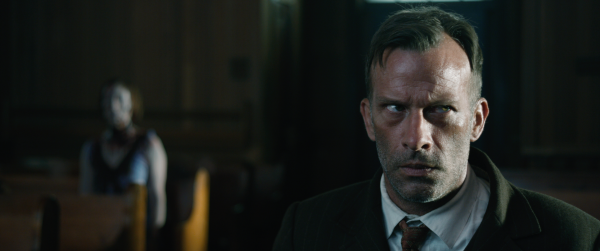You get a Stephen King adaptation! You get a Stephen King adaptation! And YOU get a Stephen King adaptation! Hollywood has gone full Oprah on the best-selling author in 2017, delivering a steady stream of projects inspired by King's prodigious catalogue. There have been world-building cosmic epics IT and The Dark Tower, serialized TV dramas Mr. Mercedes and The Mist, but it's the filmed based on King's more contained stories that have emerged as some of the most compelling, rich and faithful adaptations of the year, and as one of King's most stripped-down tales, 1922 was ripe to lay the groundwork a focused and ferocious film.
Netflix is releasing Gerald's Game later this week (read my full review here), a challenging and cathartic spin on a King novel that was long considered impossible to adapt. Next month, the will also release 1922, based on King's short story of the same name from his collection Full Dark, No Stars. As directed by Zak Hilditch (These Final Hours), 1922 is a visually elegant inspection of guilt and the consequences of violence, keyed in the theme of The Tell-Tale Heart with King's signature themes and earthy, workingman characters on full display.
Thomas Jane stars as Wilfred James, a Nebraska farmer who's already learned to hate his strident wife Arlette (Molly Parker) when she inherits a fortunes-worth of land near the local railroad and decides she wants to sell the lot, move to the city, and take their 14-year-old sonHenry (Dylan Schmid). That doesn't sit too well with Wilf, a leather tanned farmer whose land is his greatest pride, and it doesn't go over well with Henry either, who loves the farm life almost as much as he loves the beautiful girl next door. Wilf may not have luxuries like indoor plumbing, but his way of life is his law and the idea of packing up for the city makes him sick with rage. Arlette, however, has never learned to love the rural life and her intractable decision to leave it all behind drives a wedge in their already fractured marriage. So Wilf decides to kill her, as you do.
It's a poorly plotted murder, for which Wilf enlists the help of his son -- a fact that will come to haunt him even more than the rats he suddenly can't escape once the deed is done. The murder is messy and crass, not to mention shoddily executed but somehow they get away with it, despite the obviousness of their ploy and the fact that the railroad company's moneymen come knocking on their door as soon as Arlette goes missing. They may escape in the eyes of the law, but in the classic Poe tradition, the plight of the guilty manifests in more insidious. Wilf's life is poisoned, and that poison seeps through every aspect of his meager fortune, including the land he loves so much, turning his simple life upside down until he no longer recognizes the man he's become or the son he's raised.
As Wilf, Jane goes all in, trotting out a period-accurate Nebraska accent, which he spits out the side of his mouth, his jaw seemingly cemented in an unmoving grimace. It's quite the drawl, but the actor pulls it off with the power of pure commitment, carving a precise portrait of Wilf out of spit, squinting eyes, and lean workman's muscle. Parker has less to do, but she does it well, rounding Arlette into a much more appealing character than her literary counterpart; a decision that adds more dimension to Wilf's decision to straight up murder her. She's still a crude, overbearing woman -- calling her son a coward if he doesn't know the color of his girlfriend's nipples and generally giving advice in the most vulgar way possible, but she's not unlikeable and Hilditch treats her predicament as valid -- a woman who wants more from life in a period of American history when women were learning new means of independence. All around, the performances shine, an essential element in a film that takes a molasses-drip pace in unwinding Wilf's psyche.
Hilditch directs with a sharp eye for disturbing imagery -- King's novella is structured around one image in particular, which haunts Wilf after the deed is done until it overtakes him entirely. Through Hilditch's lens, it's easy enough to see how that sight would drive a man mad. These horrific bits are few and far between, but when they hit, they hit hard. Skin-crawling, stomach-turning sights surface at key intervals, a regular reminder of the rot and ruin slowly spreading through Wilf's life.
1922 struggles a bit with pacing, rushing the early bits and dragging out Wilf's long fall. The film tests audience patience a bit, the epitome of a slow burn. But 1922 also has the strength of a simple, direct story, which Hilditch honors in full (aside from one last-minute tweak) by crafting the simmering tension of certain dread. Atmospheric and sparing, 1922 is one of King's subtle nightmares, but it packs a punch by inspecting the familiar terrors of masculine pride gone wrong and the sinking spiritual punishment of a man who chooses his own damnation.
Rating: B
1922 will be available on Netflix on October 20.
For more of our Fantastic Fest coverage, be sure to check out the reviews below:
- ‘Thelma’ Review: Norway’s Oscar Contender Is a Sensual, Subdued Supernatural Drama
- ‘Anna and the Apocalypse’ Review: The Christmas Zombie Musical You Didn’t Know You Needed
- ‘Gerald’s Game’ Review: Carla Gugino Shines in a Stunning Stephen King Adaptation
- ‘Mary and the Witch’s Flower’ Review: An Enchanting Animated Adventure
- ‘Blade of the Immortal’ Review: Takashi Miike’s 100th Film Is Samurai Insanity


